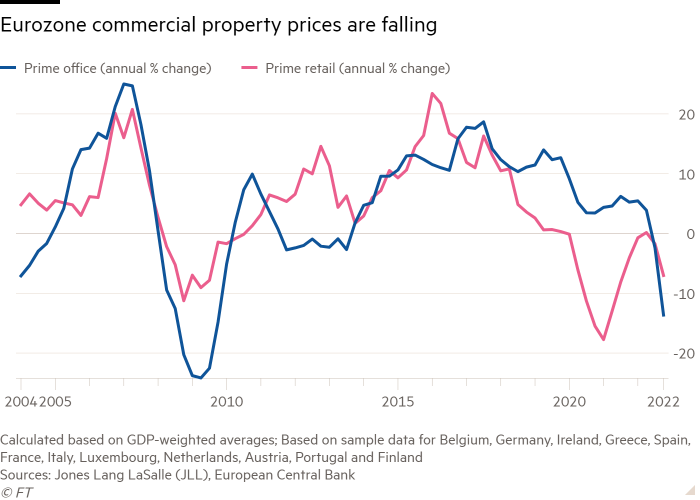The European Central Bank has called for a clampdown on commercial property funds to tackle the risk that a downturn in the €1tn sector could trigger a liquidity crisis if investors rushed to withdraw their money.
The ECB’s proposals reflect concern among regulators and investors that the recent turmoil in the banking industry could exacerbate strains in the commercial property market and push the sector closer to crisis.
Funds that invest in illiquid property assets and allow investors to pull out their money at short notice are exposed to a “liquidity mismatch” that could force them into “fire sales”, ECB officials warned in a macroprudential bulletin on Monday.
“Policies should be developed to address the structural vulnerabilities” of such open-ended property funds, the officials said, “given the risks they pose to commercial real estate markets and wider financial stability”.
The report added that the “clear signs of vulnerability” included “declining market liquidity and price corrections, driven largely by uncertainty in the macro-financial outlook and by monetary tightening”.
The MSCI Europe Real Estate index of large and mid-cap property companies tumbled 14 per cent in March to close to its lowest level since early 2009.
The ECB cited Blackstone Real Estate Income Trust’s recent decision to limit investor redemptions after a surge in requests to withdraw money out of its $125bn fund. It also noted limits imposed by UK property funds on outflows after last year’s “mini” Budget led to a sell-off in gilt markets.
The report said tighter rules would allow property funds to “manage spikes in liquidity demands and to internalise the cost of redemptions which can arise during market stress”. It added that, without sufficient liquidity management tools, such funds could “have to resort to asset fire sales, thus amplifying market stress”.

Measures proposed by the ECB include reducing the frequency at which investors can withdraw their money, requiring them to give longer notice and introducing longer minimum holding periods.
Calling for consistent application of rules on property funds across the 20-country eurozone, the ECB said funds should also charge fees on investor redemptions and impose “gates” to limit further outflows.
“On the assets side, a policy of increasing the share of liquid assets held could be explored, as it would reduce the liquidity mismatch,” the officials said, adding that these measures would make the sector better able to cope with a period of market stress.
The net asset value of real estate investment funds has more than trebled in a decade, rising from €323bn in the fourth quarter of 2012 to €1.04tn in the fourth quarter of last year, the ECB said. The funds, of which about 80 per cent are open-ended, now account for 40 per cent of eurozone commercial property markets.
But the number of transactions in the eurozone commercial property sector fell 44 per cent year on year in the final three months of last year, the report said. Prices of prime office properties in the bloc fell 14 per cent in the second and third quarters of 2022 compared with the previous year.
The ECB said the use of debt in property funds would magnify losses for investors during a downturn and increase contagion risks of any crisis to the banking system.
The Financial Stability Board, which brings together top policymakers, said in December there had been “no measurable reduction in the degree of structural liquidity mismatch” since it issued recommendations for open-ended funds in 2017.
READ SOURCE











